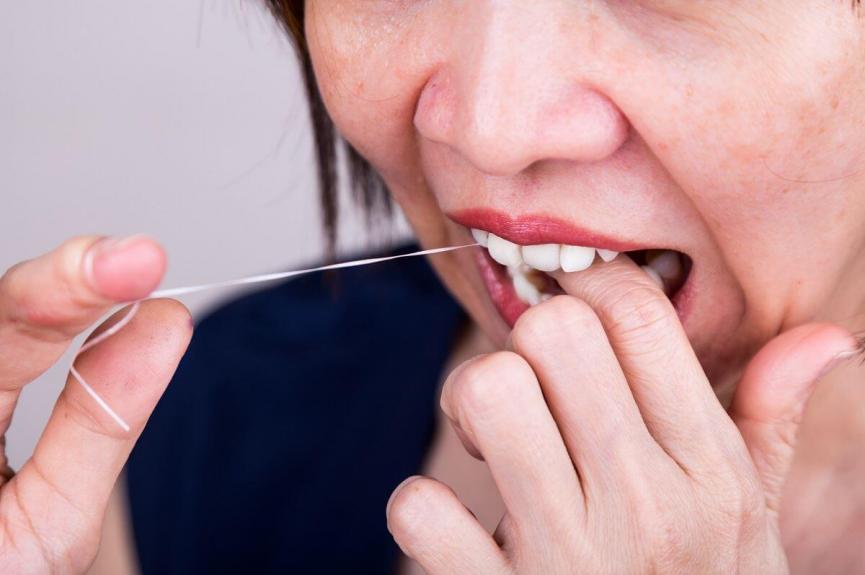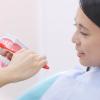
Flossing is an indispensable and important part of everyone's dental care and hygiene. It is recommended to do it at least once a day.
Dental flossing is used to clean the spaces between the teeth and at the gum line where the toothbrush cannot reach. Cleaning these spaces properly will protect your teeth from developing tooth decay and prevent the accumulation of tartar, which is the main reason for developing gingivitis and periodontitis. There is some evidence from studies that suggest regular flossing plays a role in preventing periodontal disease 1.
What is dental floss?
Dental floss is an instrument that is used to maintain proper oral hygiene. Through it, narrow interdental spaces are reached, which cannot be reached by the toothbrush and toothpaste. This is a necessary tool for maintaining proper and good personal oral hygiene. It can be used easily and it is an excellent tool for removing plaque that forms between your teeth and underneath gum. However, you should be aware that this type of cleaning does not replace toothbrushes and toothpaste, but only promotes proper oral hygiene. In various types of examinations, it has been found that flossing regularly reduces plaque and improves hygiene by about 40% 2.
Why is flossing important?
Remember that flossing is not only used to clean large food debris from the interdental spaces but it also removes plaque that remains there and that causes the development of tooth decay and gum disease.
Quite often people find excuses not to use dental floss. The most common of these are: "I don't know how to do it", "I don't think I can handle it, my teeth are too close together to floss between them", "I don't have time", "It hurts me "," My gums are bleeding or there is no food between my teeth, so I don't need to use floss ". Although it might be an annoying procedure, flossing is highly recommended by most of the dentists 3 in Singapore.
Should You Floss Before or After Brushing?
The dental specialists in Singapore recommend brushing and flossing every day. But what is the correct sequence? When should you do it - before or after brushing your teeth? Some dentists say that flossing should be done first, because it mixes up the remaining particles and plaque, which can then be removed with a toothbrush, and then the fluoride from the toothpaste can penetrate better. But other people recommend brushing your teeth first, because this will remove most of the food particles and then flossing will be able to clear some of the fluorides from the remaining toothpaste.
Researchers have found that brushing followed by flossing is a better order of oral care procedures.
What if the floss stuck between your teeth? It sometimes happened. The question is how to remove dental floss stuck in teeth? Try moving it down and then out of the teeth. Make sure you don't damage your gums because it can lead to unpleasant conditions such as bleeding and inflammation.
When should children start flossing?
For young children, flossing is recommended 1or 2 times a week, while for adults and older - 1 or 2 times a day. Children's dental floss must be done by parents 4 until the kids are old enough to handle it on their own ( up to 7 years of age).
However, it is extremely important that the instrument is used properly. Otherwise, the opposite can lead to injuries and gum infections because children's gums are much more delicate and easily hurt. Therefore, the parents need to be very good informed with each step in flossing while teaching or helping their children.
Dental tape vs floss
Dental tape and floss are similar cleaning products that are used for the same purpose - clean the interdental spaces. The difference between them is that dental floss is a thin strand of twisted plastic monofilaments or nylon filaments and dental tape is flatter and broader. The main advantage of dental floss is that is easier to use. The decision of whether to clean your teeth with dental floss or tape depends on your personal preferences.
Today on the market you can find different types of dental floss such as unwaxed floss, waxed dental floss, gum dental floss picks, tape, and so on.
Can you use dental floss if you have braces, dental bridges, or implants?
When wearing dental braces, it is important to floss your teeth and wide gaps every night, even if you brush them thoroughly. This is necessary because the metal plates have many openings and irregularities where food is retained. Due to the fact that cleaning with a thread between the braces is difficult, ordinary threads do not work with them. You should use special dental floss picks for braces.
The situation with implants and dental bridges is the same. It is crucial to know how to maintain and clean your implants and bridges wide spaces, otherwise, you may experience one or more of the complications associated with improper care. If dental implants are not properly maintained, the tissue around them can begin to bleed and become damaged. If you do not take care of this in time, it can lead to infection and even bone loss.
Usually, for cleaning around implants, dentists recommend flossing products without wax coating because this ensures that the surrounding tissues will be well protected. But on the other hand, for many types of dentures, you need to use waxed dental floss. To be sure, consult your dentist in Singapore about what to use in your case.
In conclusion
No matter how good you are and how often flossing your teeth you cannot clean them as properly as your dentist and dental hygienist will do. They normally use special instruments such as dental floss machine or ultrasonic devices to remove all of your accumulated plaque and tartar. Singapore has a very good dental specialist that can provide you with a professional cleaning and professional advice about your oral hygiene. Organizations such as the U.S. Surgeon General, the CDC, and the American Dental Association (ADA) among others recommend using dental floss 5 despite no concrete proof demonstrating the benefits in research with controlled groups. However, every dentist will agree as they see the differences between patients who floss and those that don't on a daily basis.
- 1. https://www.ncbi.nlm.nih.gov/pmc/articles/PMC5828157/
- 2. https://www.webmd.com/oral-health/features/still-not-flossing-more-reaso...
- 3. https://newsinhealth.nih.gov/2016/11/dont-toss-floss
- 4. https://www.babybonus.msf.gov.sg/parentingresources/web/Young-Children/Y...
- 5. https://www.health.harvard.edu/oral-health/is-flossing-really-necessary







